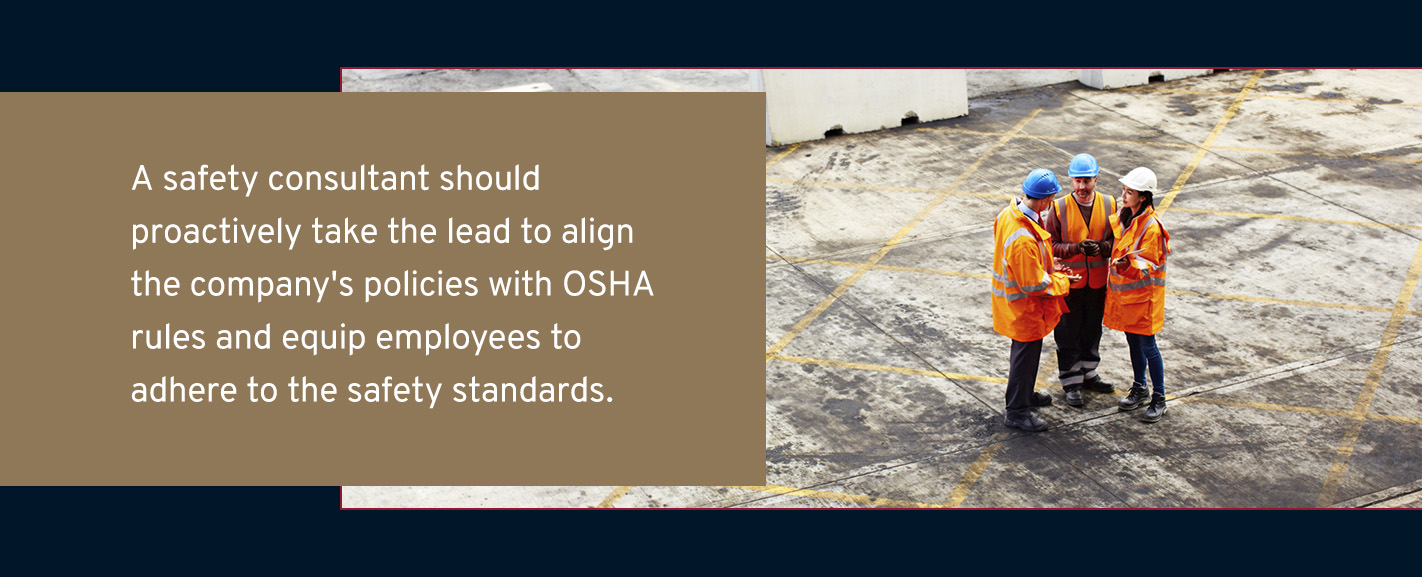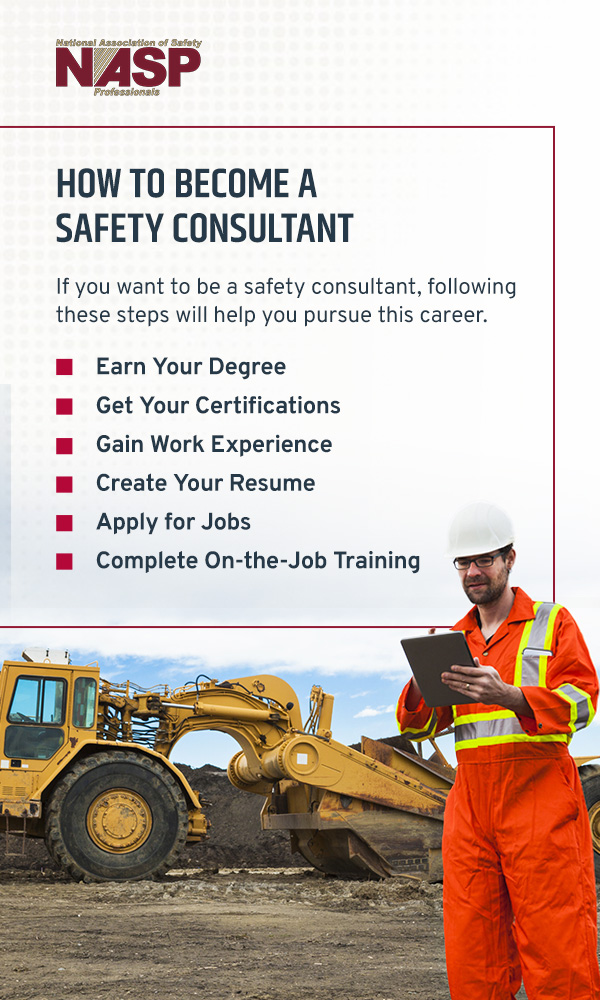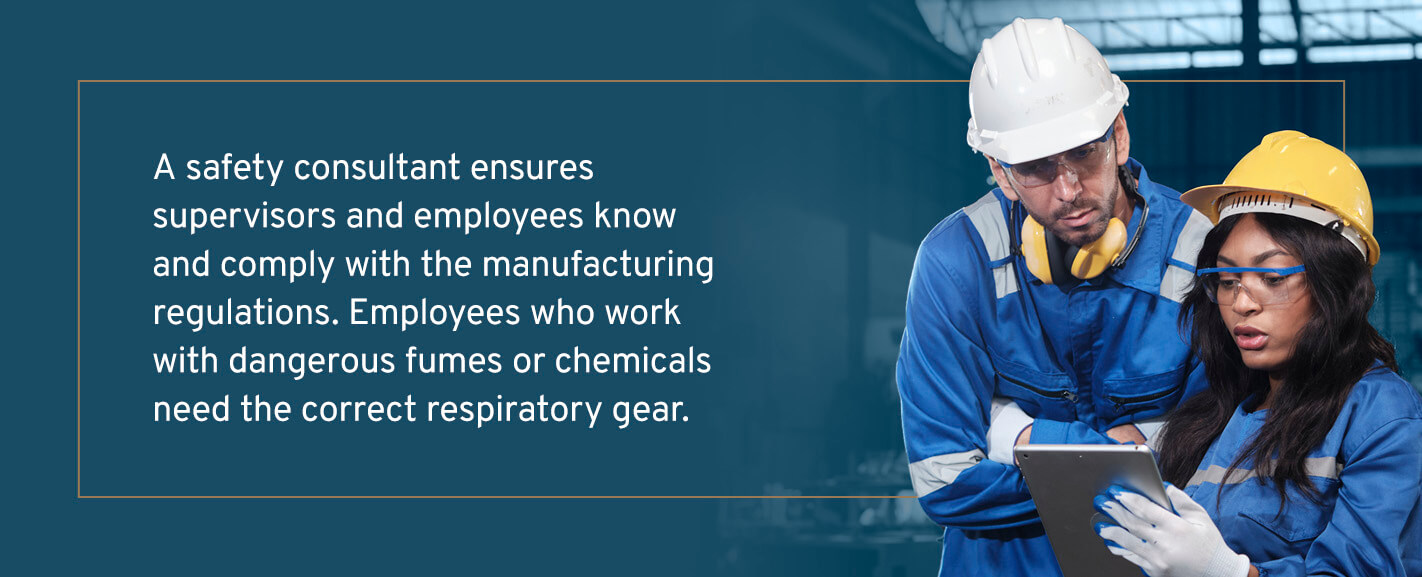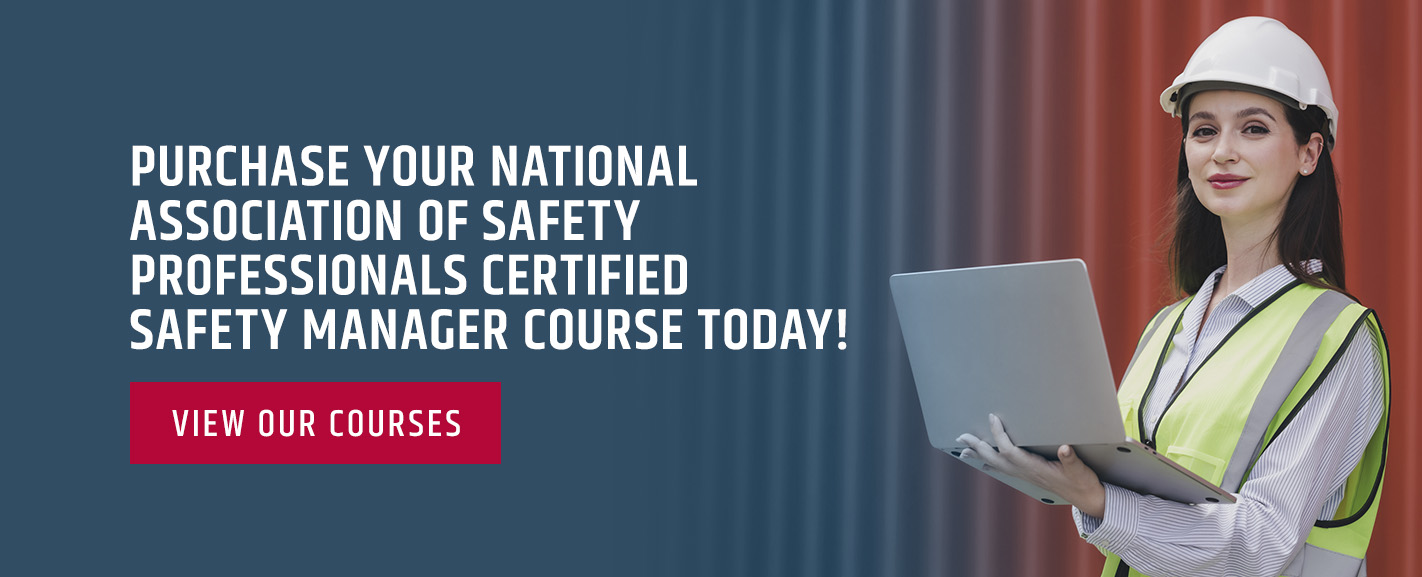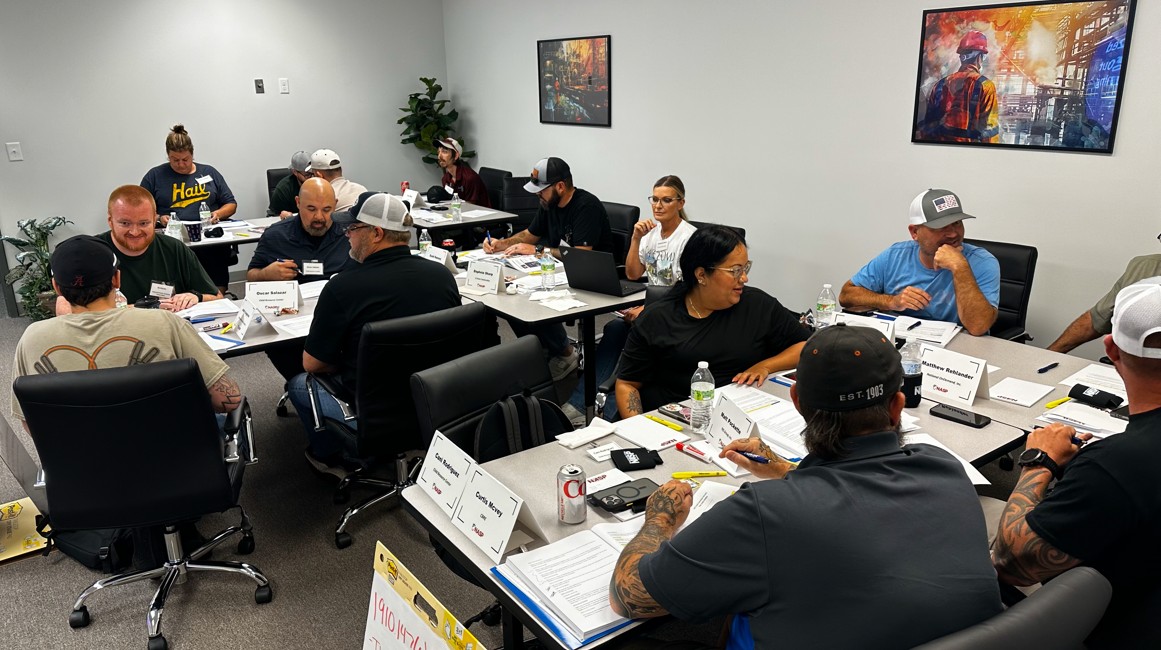How to Start Your Career as a Safety Consultant

Safety consultants provide the necessary expertise workplaces need to create a healthy environment for their employees. They are responsible for compiling guidelines that align with specific industry rules. Staying current with these trends and regulations ensures the workplace maintains compliance.
If you are considering pursuing a career as a safety consultant, you should know what steps to take to qualify for a job and what industries you could work in. Let’s look at what a safety consultant does and how to become one.
What Is a Safety Consultant?
A safety consultant is an independent third party who advises companies on various matters. Their primary focus is to ensure employee safety in a workplace or establishment. They work with the company and employees by providing training and expertise to create a safer work environment. Acting as a sounding board, a safety consultant improves processes to ensure a workplace complies with regulations defined by the Occupational Health and Safety Act of 1970.
Safety consultants have the expertise and knowledge to inspect work environments’ safety procedures and appropriate recommendations. As technology and PPE advance, safety consultants stay abreast of these changes and help workplaces adapt to remain compliant. A safety consultant should keep up to date with the latest measures and regulations through regular training and reading the latest publications.
Beyond giving these recommendations, safety consultants know how to equip supervisors to implement and maintain workplace regulations. They can accurately assess a company’s safety conditions to meet evolving standards.
Usually, safety consultants work on specific projects that run for a particular period. Companies may also hire you on a contractual basis to advise on safety standards, protocols, and regulations and provide employees with safety training. As a safety consultant, you will typically consult with various companies over your career instead of working for a single company for an extended time.
What Does a Safety Consultant Do?
A safety consultant is responsible for creating guidelines that help a company create a safer and more productive work environment. Essentially, they aim to help employees avoid accidents. They are responsible for inspecting facilities, pointing out any hazards, making recommendations to improve safety, and implementing the necessary changes to prevent accidents.
To enhance safety, they first need to understand the company’s operations, assess existing protocols, and identify areas for improvement. A safety consultant can determine whether the facility complies with OSHA and is below the permissible exposure limits by performing site audits and inspecting the facilities. If equipment or machinery is not operating correctly or is dangerous to use, a safety consultant should arrange for repairs or replacements. They also look for slip-and-fall hazards and other potential risks.
Safety consultants must listen to workers’ health-related concerns. Getting feedback from employees and acting on it creates a positive safety culture. Using the information gathered from audits and employee surveys, the safety consultant can make recommendations for the company to improve. The safety consultant will then finalize a new policy and create procedures and manuals for compliance. They may need to present their recommendations in reports or presentations.
Training and information programs are some of the tools safety consultants use to instruct employees. They need to teach employees to spot health and safety hazards in the workplace and how to avoid these dangers. In some cases, safety consultants even provide first-aid courses.
A safety consultant should proactively take the lead to align the company’s policies with OSHA rules and equip employees to adhere to the safety standards. By ensuring training aligns with OSHA safety regulations, companies can avoid costly lawsuits that may arise from accidents caused by non-compliance.
Reviewing standards, implementing plans to meet them, and maintaining appropriate records are all procedures safety consultants follow to adhere to OSHA regulations. Safety consultants also complete injury logs and submit the necessary forms to OSHA detailing injuries that resulted in lost work time, job transfers, and restricted duty. Monitoring changes will help you keep track of employee compliance and determine whether the changes have successfully enhanced workplace safety.
A safety consultant investigates the cause of an accident in a workplace. They may speak to witnesses, explore the accident scene, and photograph any damage. Once they have completed their investigation, they will create a report detailing the cause of the accident and make recommendations on how to prevent future incidents. They may also update the company’s safety policy based on their findings.
What Qualifications Do You Need to Be a Safety Consultant?
The qualifications required to become a safety consultant don’t necessarily include a college degree, though a bachelor’s or master’s degree can help you stand out when applying for jobs. Most employers seek safety consultants with relevant industry experience, training, and background in high-risk environments.
Some safety consultants have a bachelor’s degree in occupational safety and health, engineering, or a related scientific or technical field. Most employers prefer to hire safety consultants with the knowledge that helps them stay compliant, such as completing the Certified Safety Manager training course. You can improve your credentials by earning certifications showing you have the expertise to adhere to safety regulations and protocols.
How to Become a Safety Consultant
If you want to be a safety consultant, following these steps will help you pursue this career.
1. Earn Your Degree
While a college degree is not necessary to become a safety consultant, having one can increase your chances of getting a job, expand your employment opportunities, and increase your salary range. Those who choose to earn a bachelor’s degree typically major in occupational health and safety, engineering, biology, or any other technical or scientific field. The industry you want to focus on as a health and safety consultant will determine your coursework. NASP suggests enrolling with our learning partners, Columbia Southern University and Waldorf University. NASP Premium Members save 10% on tuition, among other benefits.
After completing a bachelor’s degree, some candidates study further to advance their careers. For an advanced education, a master’s degree in safety management is a wise choice. Earning a master’s degree helps students develop their analytical skills to make sound health and safety decisions in industry, public, and business environments.
2. Get Your Certifications
Having the necessary qualifications is a requirement many employers look for. Certifications show an employer you have in-depth knowledge of safety regulations and rules and know what hazards to look for to ensure they remain compliant. While you may have a bachelor’s or master’s degree, some companies prefer and even require safety certifications because they establish your professional credibility.
Taking the step to further your education by obtaining your qualifications can show potential employers you are willing to put in the time and effort to refine your skills and become a top-notch safety consultant. It also gives you the tools to implement safety programs and training in a work environment.
3. Gain Work Experience
Hands-on experience will give you an edge and build on the credentials you have already earned. Internships are an excellent way to gain work experience and feel out different industries to find the one you are passionate about.
The ideal experience for you will relate to the sector you would like to work in. For example, a construction internship will give you firsthand insight into the field and make you more desirable to employers. Work experience can prepare you for complex workplace dynamics and project scenarios.
4. Create Your Resume
Putting together a stellar resume will make you stand out to employers. Your resume should include contact details, education, certifications, skills, and work experience.
Be sure to detail the skills that apply to the role of a safety consultant. Some abilities employers look for in a safety consultant are communication, problem-solving, analytics, and in-depth knowledge of the current health and safety rules and regulations. Keep your resume clean and concise by only including information and details pertaining to the job you want.
5. Apply for Jobs
You can search for jobs online, by contacting recruiters, and through networking. Before a job interview, research the company you hope to work with. Prepare to answer questions about your education, work experience, skills, and knowledge of OSHA regulations. You can also check out NASP’s Job Mart for up-to-date EHS positions nationwide.
6. Complete On-the-Job Training
After landing your job, you may need training specific to the company and industry you are working in. Typically, safety consultants complete their training at various work sites and facilities. Depending on the company’s needs, you may work on a short-term or long-term contract and move from one assignment or location to another. Each facility and site will have its unique challenges and needs. A safety consultant must have excellent analytical and problem-solving skills and intricate attention to detail.
What Industries Need Safety Consultants?
Specific industries require a safety consultant’s expertise, primarily if they work with heavy equipment, machinery, or hazardous chemicals. When choosing a field of study, consider where you want to work. Let’s look at some of the industries that require safety consultants.
1. Construction
Workplace safety is paramount in the construction industry. Employees use heavy machinery and equipment and frequently work in hazardous conditions, such as on tall scaffolding. Construction companies must implement safety policies to protect their employees on job sites. A safety consultant in the construction field helps with pre-construction planning, which establishes regulations, surveys the site and employees, communicates safety responsibilities to supervisors and contractors, and monitors the site’s safety throughout the project.
2. Manufacturing
Manufacturing environments come with possible exposure to hazardous chemicals and machinery accidents. A safety consultant ensures supervisors and employees know and comply with the manufacturing regulations. Employees who work with dangerous fumes or chemicals need the correct respiratory gear.
3. Healthcare
While hospitals may seem like safe and sterile environments, employee accidents can still happen, such as a doctor experiencing a needlestick injury or a nurse injuring herself while lifting a patient. Airborne pathogens can also infect employees. A safety consultant can monitor and track compliance in the healthcare environment through routine screenings and surveys.
4. Transportation
Traffic accidents are a risk in the transportation industry. The transportation industry has one of the leading causes of occupational injury. A safety consultant ensures drivers are well-trained in road safety. Drivers will also need specialized safety training depending on whether the vehicle is a truck, bus, or train.
5. Oil and Gas
The primary safety concerns in the oil and gas industry pertain to machinery and vehicle use. Workers use various industrial processes to drill and service wells. These processes require specialized machinery and training. A safety consultant protects workers by enforcing compliance with the required regulatory standards.
6. Warehousing and Storage
Safety consultants educate workers in warehouses and storage facilities on safety matters such as keeping aisles clear and clutter-free. Workers who operate machinery, such as forklifts and order pickers, need training to run them responsibly.
Purchase Your National Association of Safety Professionals Certified Safety Manager Course Today!
A safety consultant is a rewarding career where you can help companies create a positive culture for employees. Our Certified Safety Manager course shows potential employers you have the skills and knowledge to independently manage their safety programs. Through this course, you will gain the abilities needed to interpret and apply regulations in the workplace, increase workers’ morale around safety, and reduce workplace accidents and injuries.
This certificate has no prerequisites, but we highly recommend having workplace safety experience. When you choose NASP, you get specialized training built for and by safety professionals. We are also IACET-accredited. View our courses and purchase your safety manager certificate today.
Related Posts


